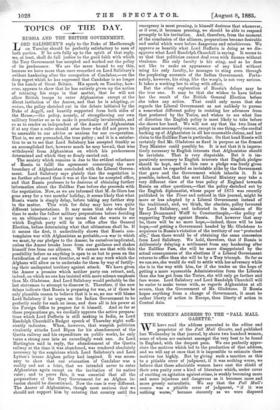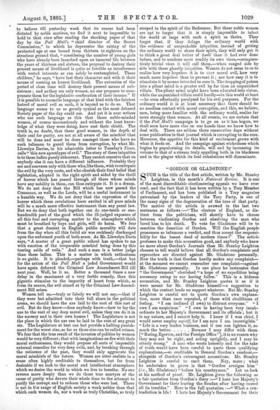THE WOMEN'S ADDRESS TO THE "PALL MALL GAZETTE." to believe
till yesterday week that its course had been dictated by noble motives, we find it next to impossible to hold to that view after reading the shocking paper of that day by the Pall Mall's "chief director of the Secret Commission," in which he deprecates the raising of the protected age at one bound from thirteen to eighteen on the atrocious ground that, "considering the number of young girls who have already been launched upon an immoral life between the years of thirteen and sixteen, the proposal to destroy their present means of livelihood is quite as forcible an interference with vested interests as can safely be contemplated. These children," he says, "have lost their chalacter and with it their means of earning an honest livelihood. The extension of the period of close time will destroy their present means of sub- sistence • and as they are only women, no one proposes to com- pensate sub- sistence; for the legislative confiscation of their income." If it is possible to reconcile language of that kind with the faintest hatred of moral evil as such, it is beyond us to do so. That language seems to us as grossly cynical as the most debased Society paper of the day could use. And yet it is over writers who use such language as this that these noble-minded women, of course unconsciously and without the least know- ledge of what they were doing, have cast their shield. The truth is, no doubt, that these good women, in the depth of their zeal for purity, are not at all aware of the mischief that will be done and must be done amongst those who have no such talisman to guard them from corruption, by what Mr. Llewelyn Davies, in his admirable letter to Tuesday's Times, calls" this new apocalypse of evil." The story of these iniquities is to these ladies purely abhorrent. They cannot conceive that on anybody else it can have a different influence. Probably they see and converse only with those who, like them, wish to extirpate the evil by the very roots, and who cherish their fond belief that legislation, adopted in the right spirit and aided by the thrill of horror which has passed through all those whose minds have any nobility in them, can thus extirpate it. It is a dream. We do not deny that the Bill which has now passed the Commons, as well as the Lords, will be a useful instrument in a humble way. We do not deny that the expression of the horror which these revelations have excited in all pure minds will be a much more effective instrument than any penal law. But we do deny that both together can do one-tenth or one- hundredth part of the good which the ill-judged exposure of all this foul and corrupting matter to the atmosphere which must be breathed by boys and girls, will do harm. We fear that a great descent in English public morality will date from the day when all this fetid air was recklessly discharged upon the unformed youth of both sexes. As Mr. Llewelyn Davis says, "A master of a great public school has spoken to me with emotion of the irreparable mischief being done by this tearing aside of veils." And such a man is a better judge than these ladies. This is a matter in which enthusiasm is no guide. It is pleaded,—perhaps with truth,—that but for the action of the Pall Mall a jaded Government would have again deferred the Criminal Law Amendment Bill till next year. Well, be it so. Better a thousand times a new delay in the enactment of a very feeble remedy, than this gigantic stimulus to the impurity of heart from which, as from its source, the evil aimed at by the Criminal Law Amend- ment Bill arises.
Women tell us,—truly or falsely we will not say,—that if they were but admitted into their full share in the political arena, we should have the axe laid to the root of this sort of evil. But do they know—does anybody know—how to lay the axe to the root of any deep moral evil, unless they can do it in the nursery and in their own homes ? The Legislature is not the place in which the axe can be laid to the root of any great sin. The Legislature at best can but provide a halting punish- ment for the worst sins, so far as those sins can be called crimes. We fear that the true result of the invasion of politics by women would be very different; that with imaginations on fire with their moral enthusiasms, they would propose all sorts of impossible external remedies for very deep evils, and, by breaking through the reticence of the past, they would only aggravate the moral mischiefs of the future. Women are utter realists in a sense often highly creditable to themselves, but far from desirable if we look to the moral and intellectual atmosphere which we desire the world in which we live to breathe. No one reveres more deeply than we do those true martyrs of the cause of purity who devote their whole time to the attempt to purify the corrupt and to redeem those who were lost. There is not in the range of English society a work nobler than that which such women do, nor a work so truly Christlike, so truly steeped in the spirit.of the Redeemer. But these noble women are apt to forget that it is simply impossible to infect the world at large with such a spirit as theirs. They forget that, if they deluge the ordinary world with the evidence of unspeakable iniquities, instead of getting the ordinary world to share their spirit, they will only get it to think a great deal better of itself than it had ever done before, and to condone more readily its own vices,—compara- tively trivial vices it will call them,—when ranged side by side with these ghastly iniquities. Women do not seem to us to realise how very hopeless it is to cure moral evil, how 'very much more hopeless than to prevent it ; nor how easy it is to stimulate it by means intended to cure it. The dropping of poison into a pliant mind is a greater evil by far than an unpunished villain. The pliant mind might have been educated into virtue, while the unpunished villain could hardly—in this world at least —be even effectually paralysed for his evil purposes. For the ordinary world it is at least necessary that there should be no needless contact with moral corruption, and this, we believe, men, being more familiar with the ordinary world, realise far more strongly than women. At all events, we are certain that if the Pall Mall's campaign is to go on as it has begun, we shall soon have more vice on our hands than we know how to deal with. There are seldom three consecutive days without some publication in that journal which is corrupting to the core. Moreover, the appetite for this kind of excitement grows with what it feeds on. And the campaign against wickedness which begins by popularising its details, will end by increasing its volume to that of a stream truly appalling both in its blackness and in the plague which its foul exhalations will disseminate.



































 Previous page
Previous page